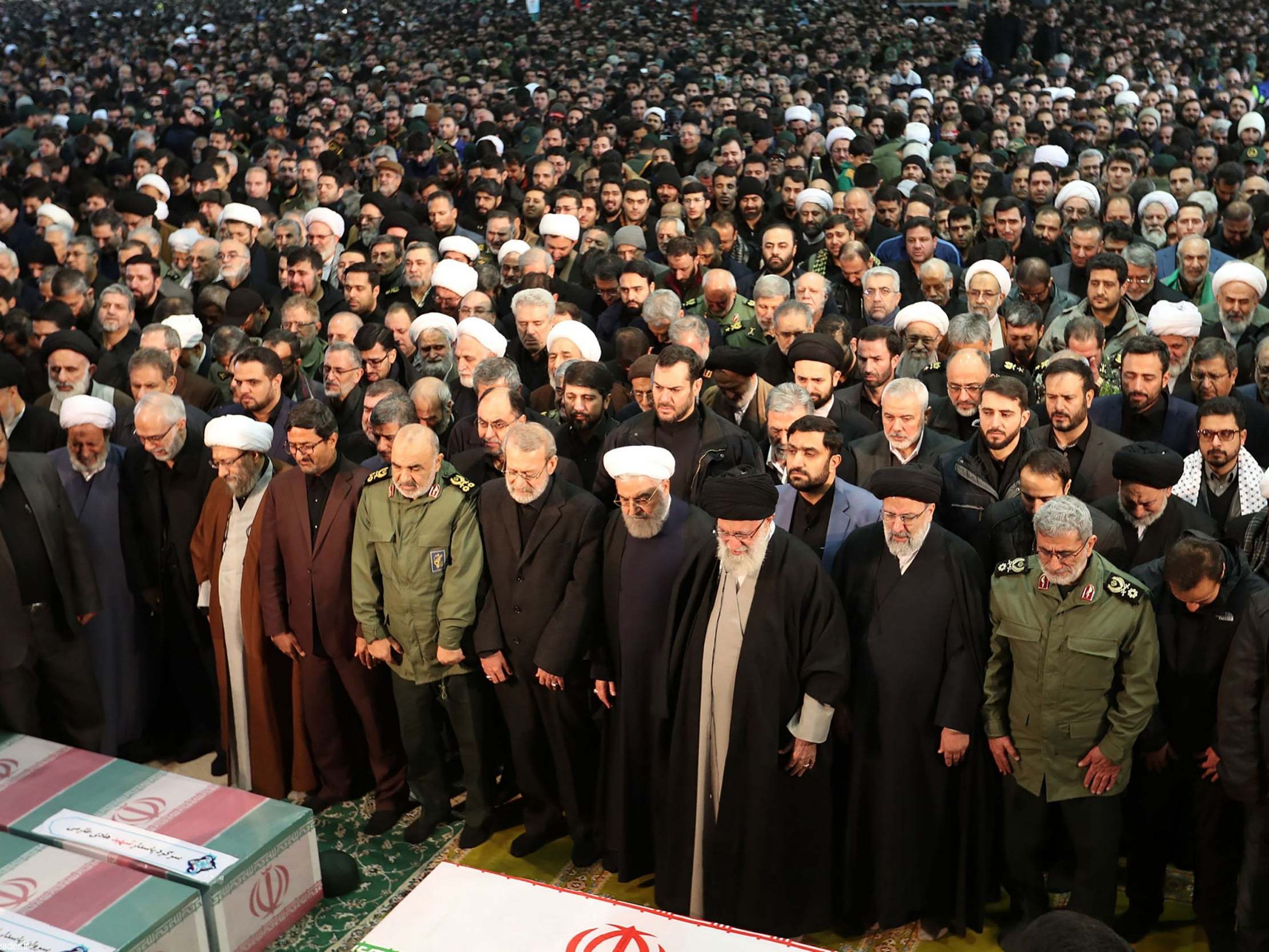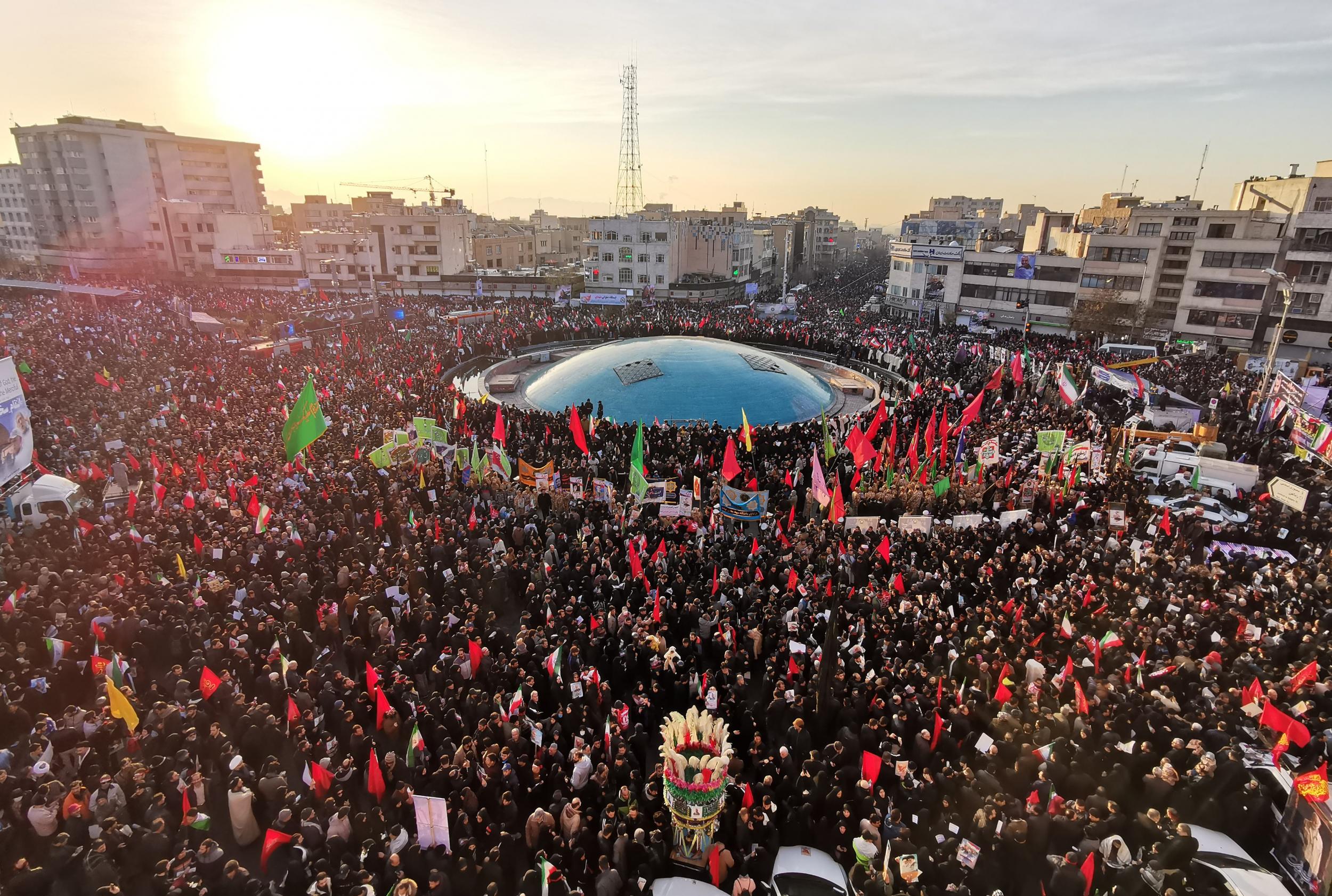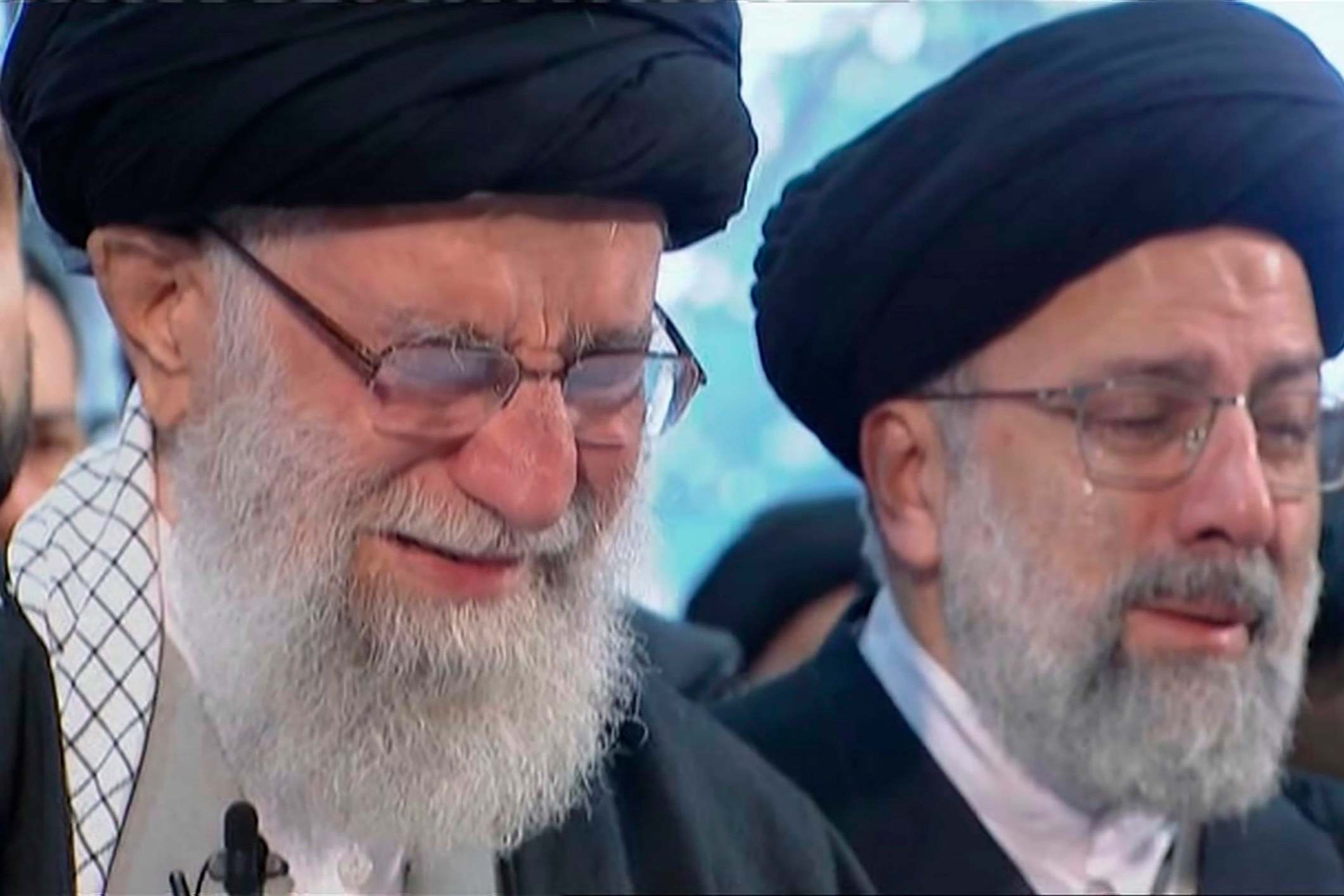Iran crisis: Trump threatens to sanction Iraq if US troops expelled as Iranian supreme leader weeps at Qassem Soleimani’s funeral
Iran state TV claims 'Millions' attend Tehran prayers for the slain Quds forces commander, in what could to be the largest since the funeral of the Islamic Republic founder
President Donald Trump has threatened to impose sanctions on Iraq and demand billions of dollars in compensation if it expels American troops, in retaliation for a US strike in Baghdad that killed one of Iran’s top generals.
The comments, which only ratcheted up soaring tensions in the region, came as Iran’s Supreme Leader Ayatollah Ali Khamenei led emotional funeral prayers in Tehran over the remains of General Qassem Soleimani, the slain head of the Quds Force, the foreign military arm of Iran’s elite Revolutionary Guards.
Iranian state TV claimed millions had poured onto the streets of the Iranian capital to bid farewell to the feared commander who was killed in a US drone strike Baghdad airport on Friday.
The scale of the crowds shown appeared to be the biggest since the 1989 funeral of the founder of the Islamic Republic, Ayatollah Ruhollah Khomeini, who led the 1979 revolution that set Iran on its political collision cause with Washington.
Mr Trump, who has twice threatened to target Iranian cultural sites despite the action being a possible war crime, also lashed out at Iraq.
Baghdad’s leadership denounced the targeted killing of Soleimani in its territory as a gross violation of its sovereignty. On Sunday the Iraqi parliament passed a resolution telling the government to end the presence of foreign troops in Iraq and ensure they not use its land, air, and waters for any reason.
Furious, the US president said his troops would not leave without being paid for its military investments in Iraq over the years and warned that he would hit Baghdad with economic penalties if forces did have to withdraw.
“We will charge them sanctions like they’ve never seen before ever. It’ll make Iranian sanctions look somewhat tame,” Mr Trump told reporters.
“If there’s any hostility, that they do anything we think is inappropriate, we are going to put sanctions on Iraq, very big sanctions on Iraq.”

He added: “We’re not leaving until they pay us back for it.”
US Secretary of State Mike Pompeo reiterated that the US military may well strike more Iranian leaders if the Islamic Republic retaliates but he tried to downplay Trump’s threat to attack Iranian cultural sites, which could be illegal under international and US military law.
Mr Pompeo said only that any strikes would be legal.
“We’ll behave inside the system,” he added. “We always have, and we always will.”
Washington has scrambled to contend with the repercussions of the surprise killing of Soleimani, which was so contentious it has been described as a declaration of war.
Tehran has already said it will no longer abide by any limits of an international nuclear deal including restrictions on the enrichment of uranium, or research and development, in a devastating blow to the 2015 deal brokered with the US, UK, France, China, Russia and Germany.
Hours later Iraq’s parliament voted to oust US and other foreign troops fighting the Islamic State.
Soleimani, 62, who oversaw the training and financing of Iran’s feared proxy groups like the Popular Mobilisation Forces in Iraq and the Lebanese Military group Hezbollah, was responsible for the deaths of hundreds of Americans, as well as overseeing the killing of civilians and sieges in places like Syria.
But to his supporters in the region, he was a key figurehead in the battle against western imperialism. His death has only galvanised that image.
In Iran on Monday Iran’s Supreme Leader Ayatollah Ali Khamenei, who had a close relationship with Soleimani, wept as he prayed over the caskets of the commander, while crowds chanted “death to America” outside.
Soleimani’s successor, Esmail Qaani stood near Khamenei’s side, as did Iranian President Hassan Rouhani and other top leaders in the Islamic Republic.
The leader of the Palestinian militant group Hamas that governs the blockaded Gaza Strip was also in attendance.
Ismail Haniyeh, in an address to Iranian mourners, described Soleimani, as “the martyr of Jerusalem.”
Soleimani’s daughter Zeinab also spoke reiterating that her father’s killing will only “resurrect” the cause.
“Crazy Trump, don’t think that everything is over with my father’s martyrdom,” she said.
Qaani, the new head of the Quds force, made his own threat in an interview with Iranian state television also aired on Monday.
“God the Almighty has promised to get his revenge, and God is the main avenger. Certainly, actions will be taken,” he said.

He added Iran would continue Soleimani’s path and said, “the only compensation for us would be to remove America from the region.”
Over the last few days, mass funerary processions have taken place across the country, which up until recently had been gripped by nationwide anti-government protests during which over 300 people were reportedly killed.
The commander’s assassination appears to have temporarily silenced that anger and instead has seen politicians and leaders across the Islamic Republic’s political spectrum take part in the mourning.
It has also united factions in Iraq against the US: rival Shi’ite leaders, including ones opposed to Iranian influence, have united in calling for the expulsion of American troops.
Mr Trump’s decisions and statements have been met with shock and confusion from his western allies.

Germany’s foreign minister Heiko Maas told Deutschlandfunk radio on Monday it’s “not very helpful” to threaten sanctions on Iraq, and said together with other European powers they would talk to Iran to try to salvage the nuclear agreement.
France’s Finance Minister Bruno Le Maire meanwhile said that the tensions in the Middle East would only serve the Islamic State and “increase the terrorist threat over France and Europe.”
In a statement late Sunday Prime Minister Boris Johnson and his French and German counterparts Emmanuel Macron and Angela Merkel called for all sides to work towards an urgent easing of tensions in the Persian Gulf saying there is an “urgent need for de-escalation”.
Join our commenting forum
Join thought-provoking conversations, follow other Independent readers and see their replies
Comments
Bookmark popover
Removed from bookmarks